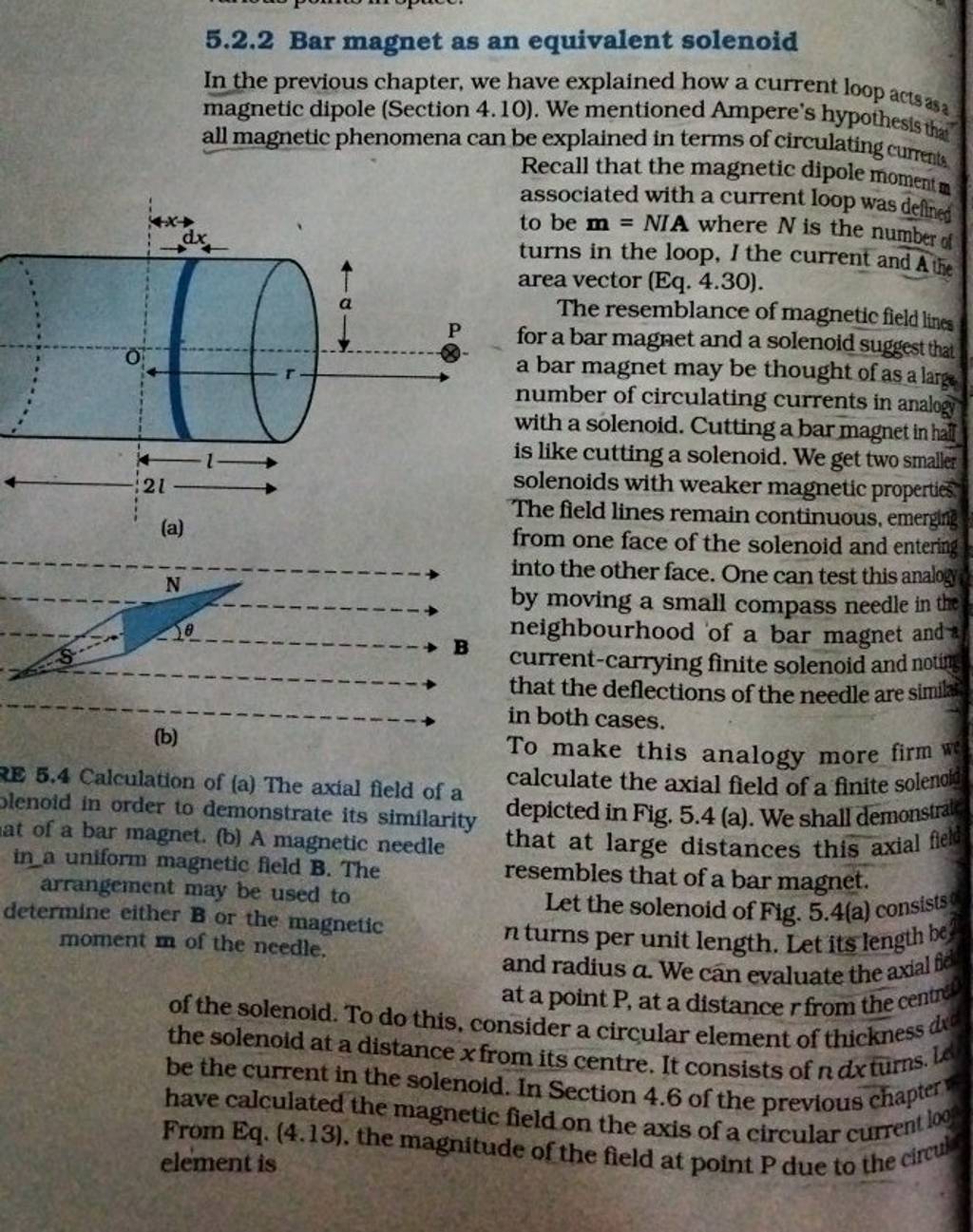Question
Question asked by Filo student
5.2.2 Bar magnet as an equivalent solenoid In the previous chapter, we have explained how a current loop acts assz magnetic dipole (Section 4.10). We mentioned Ampere's hypo all magnetic phenomena can be explained in terms of circulationgestic moment in associated with a current loop was deffined to be A where is the number of turns in the loop, the current and the area vector (Eq. ). The resemblance of magnetic field lines for a bar magnet and a solenoid suggest that a bar magnet may be thought of as a large number of circulating currents in analogy with a solenoid. Cutting a bar magnet in half is like cutting a solenoid. We get two smallet solenoids with weaker magnetic propertiess The field lines remain continuous, emerglifg (a) from one face of the solenoid and entering into the other face. One can test this analogy by moving a small compass needle in the neighbourhood of a bar magnet and current-carrying finite solenoid and notifts that the deflections of the needle are similis in both cases. (b) To make this analogy more firm we 5.4 Calculation of (a) The axial field of a calculate the axial field of a finite solenoli) plenoid in order to demonstrate its similarity depicted in Fig. (a). We shall demonstrally at of a bar magnet. (b) A magnetic needle that at large distances this axial fill in a uniform magnetic field . The resembles that of a bar magnet. arrangement may be used to Let the solenoid of Fig. 5.4(a) consists? determine either or the magnetic turns per unit length. Let its length be? moment of the needle. and radius a. We can evaluate the axal fic at a point , at a distance from the centri of the solenoid. To do this, consider a circular element of thickness dre the solenold at a distance from its centre. It consists of turns. it be the current in the solenoid. In Section of the previous chapter have calculated the magnetic field on the axis of a circular current loo From Eq. (4.13), the magnitude of the field at point due to the circult element is

Found 6 tutors discussing this question
Discuss this question LIVE
10 mins ago

One destination to cover all your homework and assignment needs
Learn Practice Revision Succeed

Instant 1:1 help, 24x7
60, 000+ Expert tutors

Textbook solutions
Big idea maths, McGraw-Hill Education etc

Essay review
Get expert feedback on your essay

Schedule classes
High dosage tutoring from Dedicated 3 experts
Practice more questions on Magnetism, EMI and AC
Question 2
Medium
Views: 5,998
Question 3
Medium
Views: 5,611
Question 4
Medium
Views: 5,628
Students who ask this question also asked
Question 1
Views: 5,994
Question 2
Views: 5,628
Question 3
Views: 5,904


Stuck on the question or explanation?
Connect with our Physics tutors online and get step by step solution of this question.
231 students are taking LIVE classes
| Question Text | 5.2.2 Bar magnet as an equivalent solenoid
In the previous chapter, we have explained how a current loop acts assz magnetic dipole (Section 4.10). We mentioned Ampere's hypo all magnetic phenomena can be explained in terms of circulationgestic moment in associated with a current loop was deffined to be A where is the number of turns in the loop, the current and the area vector (Eq. ).
The resemblance of magnetic field lines for a bar magnet and a solenoid suggest that a bar magnet may be thought of as a large number of circulating currents in analogy with a solenoid. Cutting a bar magnet in half is like cutting a solenoid. We get two smallet solenoids with weaker magnetic propertiess The field lines remain continuous, emerglifg
(a) from one face of the solenoid and entering into the other face. One can test this analogy by moving a small compass needle in the neighbourhood of a bar magnet and current-carrying finite solenoid and notifts that the deflections of the needle are similis in both cases.
(b) To make this analogy more firm we 5.4 Calculation of (a) The axial field of a calculate the axial field of a finite solenoli) plenoid in order to demonstrate its similarity depicted in Fig. (a). We shall demonstrally at of a bar magnet. (b) A magnetic needle that at large distances this axial fill in a uniform magnetic field . The resembles that of a bar magnet. arrangement may be used to
Let the solenoid of Fig. 5.4(a) consists? determine either or the magnetic turns per unit length. Let its length be? moment of the needle. and radius a. We can evaluate the axal fic at a point , at a distance from the centri of the solenoid. To do this, consider a circular element of thickness dre the solenold at a distance from its centre. It consists of turns. it be the current in the solenoid. In Section of the previous chapter have calculated the magnetic field on the axis of a circular current loo From Eq. (4.13), the magnitude of the field at point due to the circult element is |
| Updated On | Jan 6, 2023 |
| Topic | Magnetism, EMI and AC |
| Subject | Physics |
| Class | Class 12 |
| Answer Type | Video solution: 1 |
| Upvotes | 124 |
| Avg. Video Duration | 8 min |
